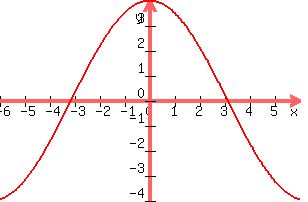Question 435668: Sorry this is calculus but I thought I would take a stab at it anyway.
A rectangle is to be inscribed under the arch of the curve y=4cos(x/2) from x = - (pi)radians and x= (pi) radians. What are the dimensions of the rectangle with the largest area? My professor wants me to work in radians and use Newton's method to find the zero of the first derivative.
Answer by richard1234(7193)   (Show Source): (Show Source):
You can put this solution on YOUR website! 
If we have a rectangle with coordinates (x,0), (-x,0), (x,4 cos(x/2)) and (-x, 4cos(-x/2)), we can say that the dimensions are 2x and 4 cos (x/2) (note that cosine is even and symmetric). Hence, our area A is equal to  . .
To find  , use the product rule: , use the product rule:

Then, set this to zero with x defined between  and and  . .
|
|
|